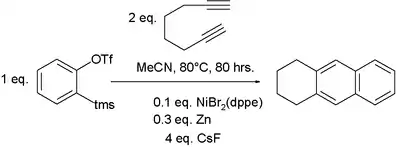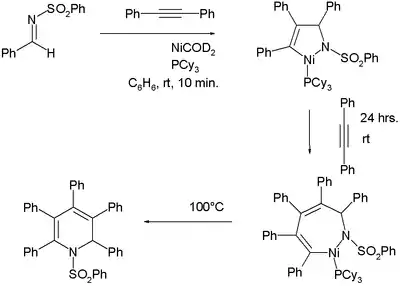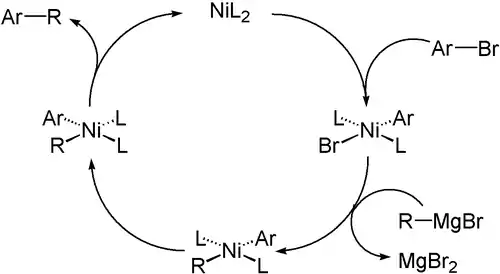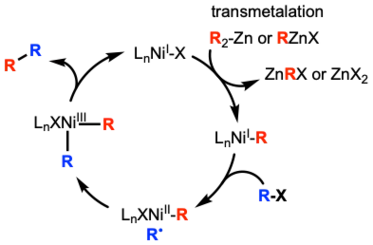有机镍化学
有機鎳化學是一門研究含有碳-鎳化學鍵的化合物(有機鎳化合物)的理化性質、合成與反應的學科,是有機金屬化學的分支[1][2] 。四羰基鎳是第一個被人類合成的有機鎳化合物,被化學家路德維希·蒙德在1890年首度合成。它立刻被用於蒙德法來提煉鎳金屬。隨後有機鎳化合物用於不同過渡金屬催化反應的催化劑。

organonickel
分類與合成
在鎳化合物中,鎳的氧化數多爲0或者+2。有很多鎳的烷基或芳基配合物的化學式都是NiR(X)L2。而NiR2類的鎳配合物有時只有12個價電子,而他們會透過溶劑化來增加自己的價電子數,穩定自己。
而鎳的烯烴配合物較爲常見。例如具備兩個環辛二烯配體的雙(1,5-環辛二烯)鎳,它是一個18電子的配合物,其中有去10個電子由鎳提供,而剩餘的4×2個電子有配體的雙鍵提供。它對空氣極爲敏感[3],可溶於有機溶劑[4][5]。鎳的烯烴配合物有較多實際的用途,例如可以用於壳牌高级烯烃过程[6]等烯烴的聚合反應中。
烯丙基型鹵代烴可以與四羰基鎳反應生成(烯丙基)2Ni2Cl 2[7]。它是一種π-烯丙基配合物,鎳的氧化數為+2,是烯丙基親核試劑的來源。
鎳亦可以跟卡賓生成配合物,其中包含碳-鎳雙鍵: [8]
 —
—
是一個常用的試劑[9]。
反應
烯烴或炔烴的低聚
鎳化合物可以催化烯烴或炔烴的低聚。例如在氰化鎳的存在下,乙炔四聚成環辛四烯[10]。
溴化鎳、鋅可以成爲 [2+2+2]環加成反應的催化劑,反應涉及到苯炔[11]。鋅可以把二價鎳還原成零價鎳。

在這些實驗中,鎳配合物的存在可能不太明顯,但如果細心地設計實驗,鎳配合物中間體便可以定量生成[12][13]:
參考資料
- F.A. Carey R.J. Sundberg Advanced Organic Chemistry 2nd Ed. ISBN 0-306-41199-7
- Comprehensive organometallic chemistry III Robert Crabtree, Mike Mingos 2006 ISBN 0-08-044590-X
- Wilke, G. . Angewandte Chemie International Edition. 1988, 27 (1): 185–206. doi:10.1002/anie.198801851.
- Schunn, R. A.; Ittel, S. D.; Cushing, M. A. 28. 1990: 94–98. ISBN 978-0-470-13259-3. doi:10.1002/9780470132593.ch25.
|journal=被忽略 (帮助) - Wender, Paul A.; Smith, Thomas E.; Duong, Hung A.; Louie, Janis; Standley, Eric A.; Tasker, Sarah Z. . Encyclopedia of Reagents for Organic Synthesis (American Cancer Society). 2015: 1–15. doi:10.1002/047084289x.rb118.pub3 (英语).
- Olivier-Bourbigou, H.; Breuil, P. A. R.; Magna, L.; Michel, T.; Espada Pastor, M. Fernandez; Delcroix, D. . Chemical Reviews. 2020, 120 (15): 7919–7983. PMID 32786672. doi:10.1021/acs.chemrev.0c00076.
- Martin F. Semmelhack and Paul M. Helquist (1988). "Reaction of Aryl Halides with π-Allylnickel Halides: Methallylbenzene". Org. Synth. 52: 115; Coll. Vol. 6: 161.
- Danopoulos, Andreas A.; Simler, Thomas; Braunstein, Pierre. . Chemical Reviews. 2019, 119 (6): 3730–3961. PMID 30843688. doi:10.1021/acs.chemrev.8b00505.
- Göttker-Schnetmann, Inigo; Mecking, Stefan. . Organometallics. 2020, 39 (18): 3433–3440. doi:10.1021/acs.organomet.0c00500.
- Reppe, Walter; Schlichting, Otto; Klager, Karl; Toepel, Tim. [Ring-forming polymerization of acetylene. I. Cyclooctatetraene]. Justus Liebigs Annalen der Chemie. 1948, 560 (1): 1–92. doi:10.1002/jlac.19485600102.
- Jen-Chieh Hsieh and Chien-Hong Cheng. . Chemical Communications. 2005, 2005 (19): 2459–2461. PMID 15886770. doi:10.1039/b415691a.
- Formation of an Aza-nickelacycle by Reaction of an Imine and an Alkyne with Nickel(0): Oxidative Cyclization, Insertion, and Reductive Elimination Sensuke Ogoshi Haruo Ikeda, and Hideo Kurosawa Angew. Chem. Int. Ed. 2007, 46, 4930 –4932 doi: 10.1002/anie.200700688
- Reaction of the imine N-(benzenesulfonyl)benzaldimine with two equivalents of diphenylacetylene with NiCOD2 and tricyclohexylphosphine first to nickelapyrroline and with a second insertion a nickeldihydroazepine and finally on heating a dihydropyridine
- Kohei Tamao, Koji Sumitani, Makoto Kumada. . J. Am. Chem. Soc. 1972, 94 (12): 4374–4376. doi:10.1021/ja00767a075.
- Anthony O. King, Nobuhisa Okukado and Ei-ichi Negishi. . Journal of the Chemical Society Chemical Communications. 1977: 683. doi:10.1039/C39770000683.
- Strategic Applications of Named Reactions in Organic Synthesis Laszlo Kurti, Barbara Czako Academic Press (March 4, 2005) ISBN 0-12-429785-4
This article is issued from Wikipedia. The text is licensed under Creative Commons - Attribution - Sharealike. Additional terms may apply for the media files.





